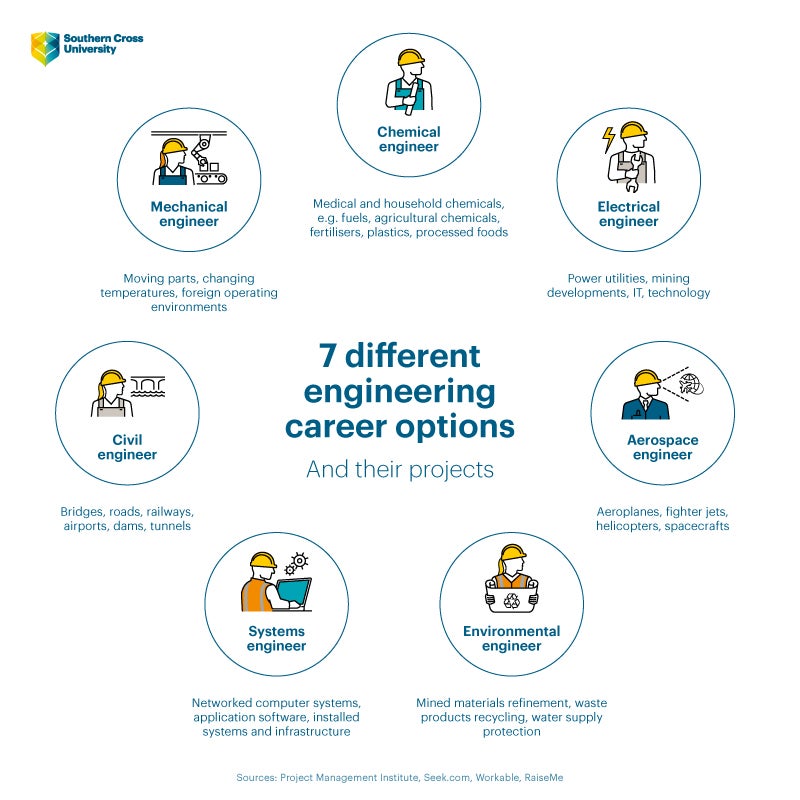Some people become interested in engineering because they’re attracted to the idea of building major infrastructure — airports, bridges, railway systems, skyscrapers and more.
Others have an interest in how things such as computer systems, electronic circuits, software and apps work. Still, more are interested in making cities more liveable, bringing fresh water to villagers in developing nations, or designing launch vehicles that can transport people safely to space and back.
Engineering applications in society require professionals whose specialties suit those applications. This means there is a broad choice of specialisations for those who are interested in a career that involves putting things together and making them work.
There are also significant job vacancies in engineering. Engineers Australia reports a 44 per cent increase in vacancies in the first half of 2021 on pre-pandemic levels. Australia also has over 160 projects on the Infrastructure Priority List in 2021, which means demand for engineers will continue.
As technology advances and industries require additional skill sets, engineering disciplines continue to develop and change. This means professional work choices can also be a little overwhelming. A good place to start is to develop an understanding of what types of engineers there are. The engineering profession is as diverse and exciting as it is pivotal to the infrastructure programs and industries that are shaping the future.
Remember that no matter what type of engineering you choose to specialise in, postgraduate study in engineering management, such as a Master of Engineering Management degree, can help set you apart and prepare you for great success.
Civil engineer
For those with an urge to build major infrastructure that will potentially exist for centuries, civil engineering could be your field. This discipline covers many types of structures, from bridges and roads, railways and airports, to dams and tunnels. Civil engineers are one of the engineering sector's most in-demand professions.
It can also involve smaller, more intimate projects in city spaces such as parks and playgrounds, underpasses and riverside/coastal promenades and major urban systems for utilities such as water.
How do you plan to house the growing population in some countries, or address the structural challenges that climate change brings? These are just some of the challenges a civil engineer will work to solve.
Without civil engineers, our cities would break down. These professionals facilitate the flow of people and goods, services and resources, light and energy. They plan and execute for the future needs of the human population by building, tunnelling and connecting.
Mechanical engineer
Any machine that requires construction has likely involved a mechanical engineer. Moving parts, changing temperatures, foreign operating environments, weight and strength of materials are all responsibilities of a mechanical engineer.
What types of mechanical engineers are there? Robotics is a booming industry for mechanical engineers. Agriculture is another environment where mechanical engineers are in demand.
As automation continues to drive industry, machines do the work that was previously carried out by humans. Mechanical engineers help build those machines to improve workplaces and free up employees for higher-level purpose. It's an interesting time to get into mechanical engineering as changes in the job landscape and labour shortages cause the increased use of robotic technology. Mechanical engineers are in demand in Australia and typically earn around $2414 weekly.
Electrical engineer
In this digital age, the role and importance of electrical engineers are transforming. The smaller and more complex electrical circuits become, the more vital the role of engineers in ensuring they operate as intended.
That’s not to say that electrical engineers don’t still work on major projects such as power plants, mining developments, and power solutions for major towns and cities. But they’re also now in enormous demand in the IT and technology arenas. It's surprising what types of engineers there are in the electrical world.
Any device or system that requires energy to operate may well have been developed by an electrical engineer. According to the Founder and Executive Chairman of the World Economic Forum, Klaus Schwab, the merging of technologies that is blurring the lines between the physical, digital and biological spheres are set to ‘disrupt nearly every industry around the world and transform entire systems of production, management, and governance.’ As a result, mechanical engineers and electrical engineers will find themselves in greater demand as technology has a greater impact on people’s lives.
There has never been a better time to get into this type of engineering work, and a Master of Engineering Management can set you apart from other job seekers. Statistics show that there is significant demand for electrical engineers in Australia, with an average salary of $2165 weekly.


Chemical engineer
A chemical engineer brings the principles of chemistry, mathematics, physics and microbiology to creating new and exciting products for household use, the medical field, or any arena that requires chemical products.
Examples of chemically engineered products include washing detergents, pharmaceuticals, plastics, processed foods, industrial chemicals, fuels, agricultural chemicals, fertilisers, insecticides and many more. The COVID-19 pandemic highlighted the importance of chemical engineering in vaccine production, where teams worked in multidisciplinary collaboration and used different techniques to create an effective vaccine.
The chemical engineer improves the quality of life for all of us, whether it’s through the development of medications, more sustainable and affordable fuel and energy options, or chemicals that enable new microelectronics. Chemical engineering is a constantly evolving area and makes a difference to lives across the world.
Systems engineer
As various disciplines of engineering become more complex and technologically advanced, they converge and collaborate more often.
In the past, for instance, the construction of a metro rail system mainly involved civil and electrical engineers. These days, however, the rail system has to work with digital apps and artificial intelligence technology. It must communicate with bus systems, traffic control systems and weather data to predict ridership demand in real-time. It requires security, not just in a physical sense but also in a cyber sense.
This must all be developed in an environment in which passengers expect greater efficiencies and individualisation of customer experience.
The world has transformed in the last year, especially as a consequence of COVID-19 when many businesses had to adopt digitalisation at speed. This sparked a transformation in key infrastructures, such as hospitals increasingly treating outpatients online, and banks using less physical cash. All these required systems engineers to make them happen.
Systems work involves the coming together of numerous engineering disciplines on one project. That project, at its core, will require a systems engineer to focus on how multidisciplinary work will combine to create, manage and maintain the infrastructure.
The Engineering Futures 2035 scoping study reports that there is a strong employment growth of 21 per cent predicted for software and applications programmers in the next five years, 60 per cent of whom will be required in professional services.

Environmental engineer
Every infrastructure project, whether a road or a bridge, a mine or a power plant, has environmental challenges to overcome. These may be in the soil upon which the bridge is built, the refinement of the raw materials produced in the mine, the recycling of waste products from an energy plant, or the protection of a water supply.
The environmental engineer solves such issues through the use of principles in chemistry, biology, geology, ecology, microbiology and more. They also typically have a good working knowledge of other forms of engineering. Their work is needed in many areas, from an irrigation program in the developing world to reviewing the impact of a new mining project. Advising in the face of a major disaster is another area where an environmental engineer will operate.
A typical weekly salary for an environmental engineer is $2165, and there is a strong demand for qualified professionals.
Aerospace engineer
Working in a niche field of engineering, aerospace specialists are specifically concerned with the development of vehicles that are intended to fly – mainly aeroplanes, helicopters and spacecraft.
The aerospace engineer might work on the newest passenger aircraft, a highly secretive fighter jet project, or a rocket built to launch a satellite to a distant planet.
Aerospace engineers are in demand as they are highly specialised. Typically, they earn $2155 a week in Australia.
Discover your engineering career path
Engineering is a diverse and interesting profession, and it offers a range of specialist career areas to choose from. Now that you have an understanding of what types of engineers there are in various fields of specialty, learn more about becoming a leader in your industry by studying a Master of Engineering Management with SCU Online.






